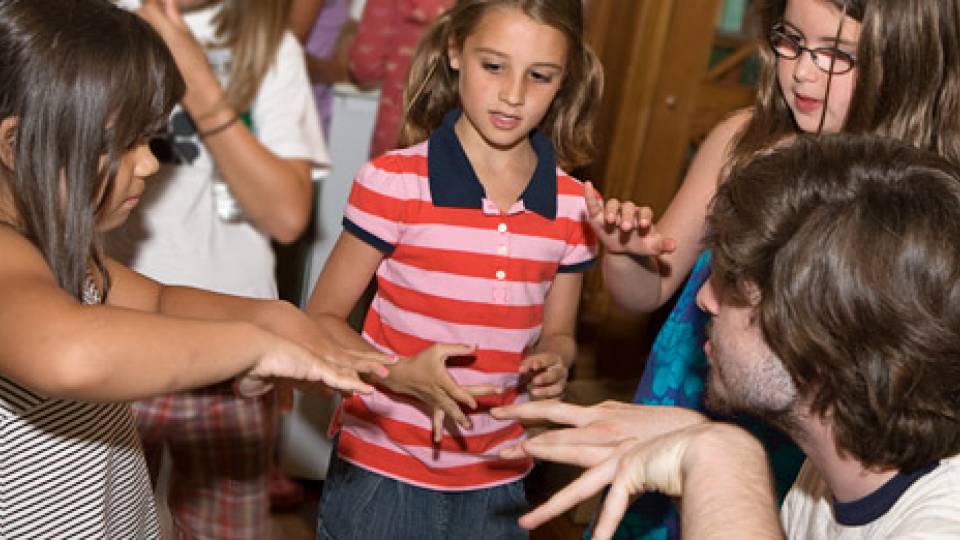through the pages of a tattered and browned journal at the Princeton Historical Society on Nassau Street surrounded by a group of Princeton students, Henry "Hank" Pannell brushes his fingers across his grandmother's script. She died many decades ago, but in this journal she is still very much alive.
Carrie Pannell was, in 1932, one of the founding members of the Friendship Club, an African-American women's league in Princeton. In the journal, the group of about a dozen women recorded the sales of their fund-raisers, cut out and pasted inventories of the food baskets they assembled for shut-ins, and listed the names of students in the community to whom they awarded scholarships and contributions they'd made to organization such as the NAACP.
To Hank Pannell, nothing he sees in it is news. He's heard the stories about the ladies and their club. He also remembers vividly what life in the John-Witherspoon community was like before it began to fade away like the pages of the ladies' journal. To the half dozen Princeton students gathered around him, this is history that they never knew existed.
As part of Kathryn Watterson's fall writing seminar ("Life Stories: Writing Oral History"), the students have been combing through archives and collecting the oral history of the once thriving African-American community bounded now by Paul Robeson Place to Birch Avenue, and Witherspoon to John streets. Since last year, Watterson and her students have interviewed 36 people connected with the community. They expect to compile about 50 interviews, along with a collection of essays, for a book to be published in the spring.
"I was surprised to learn about the historic African-American community and the extensive role they played in Princeton," said freshman Shawn Sindelar. "Before I took this class, I didn't know that the community was that large and that influential, or about the troubles they had had in the past 100 years."
Maureen Smyth, curator at the Historical Society, described the students as "pioneers" because the history of the African-Americans in Princeton has been neglected for a long time.
Hank Pannell, who persuaded Watterson to do this project, is even more emphatic about the necessity to archive. "I see the community dissolving, and I'd like to see the history recorded before it's gone."
Pannell, the 61-year-old supervisor of maintenance for the Housing Authority in the Borough of Princeton, is a native of the John-Witherspoon community. He also collects and repairs donated computers to give to children in the neighborhood and organizes computer classes for seniors and youths at the Clay Street Learning Center.
Five generations of his family have lived in Princeton, but that is becoming unusual for other African-American families, he said. Their children have moved for better economic opportunities, and the need for more lower-cost housing in Princeton has put incredible pressure on older residents to sell, often times to people with no roots in the community.
Watterson, a lecturer in the Council of the Humanities and the Princeton Writing Program, said her students have expressed the feeling of being in a completely different world just by walking six blocks off the University campus into the John-Witherspoon neighborhood.
Sophomore Linda Madueme said she not only has learned a lot, she also feels she has developed a special kind of intimacy with the community."
"A lot of times you feel like you've bonded with the person you're interviewing by the end of the interview because they have just shared their life story with you. It's an incredible feeling," she said.
Watterson said this class, sponsored by the Program in African-American Studies and the University's Community-Based Learning Initiative, has been exciting and daunting for her. "I've done some of the interviews, and one of the things I've been struck by is the number of people who say, 'Oh, I wish I had asked my grandmother or my grandfather this or that.' And a lot of the residents we talked with had grandparents or great-grandparents who were in slavery. It was such a painful subject that most people did not talk about it. So the storytelling is very limited there.
"One of the things I'm excited about is that the stories of these folks are not going to be lost, and maybe this book will inspire young people to talk to their own grandparents and go further with these stories before it's too late," Watterson said.
Contact: Justin Harmon (609) 258-3601






